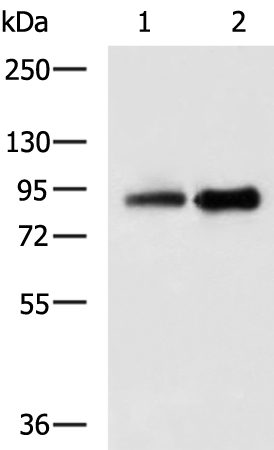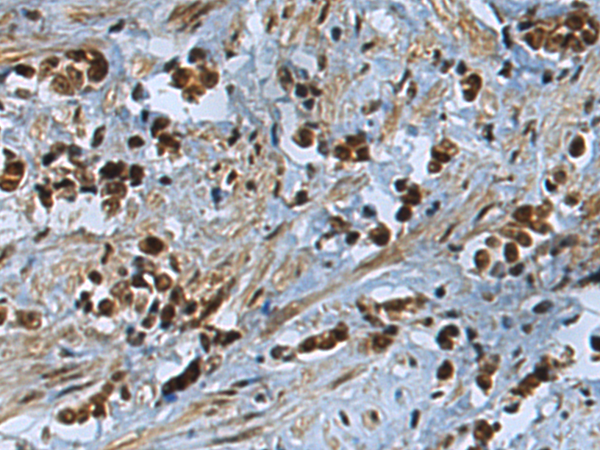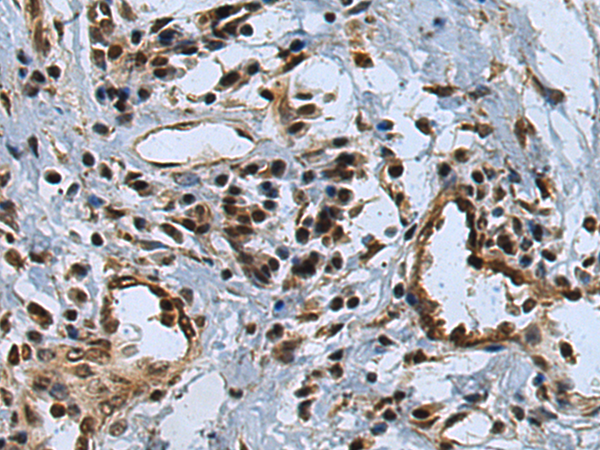


| WB | 咨询技术 | Human,Mouse,Rat |
| IF | 咨询技术 | Human,Mouse,Rat |
| IHC | 1/25-1/50 | Human,Mouse,Rat |
| ICC | 技术咨询 | Human,Mouse,Rat |
| FCM | 咨询技术 | Human,Mouse,Rat |
| Elisa | 1/5000-1/10000 | Human,Mouse,Rat |
| Aliases | AAA; AD1; PN2; ABPP; APPI; CVAP; ABETA; PN-II; preA4; CTFgamma |
| WB Predicted band size | 87 kDa |
| Host/Isotype | Rabbit IgG |
| Antibody Type | Primary antibody |
| Storage | Store at 4°C short term. Aliquot and store at -20°C long term. Avoid freeze/thaw cycles. |
| Species Reactivity | Human, Mouse, Rat |
| Immunogen | Synthetic peptide of human APP |
| Formulation | Purified antibody in PBS with 0.05% sodium azide and 50% glycerol. |
+ +
以下是关于APP抗体的3篇参考文献概览:
1. **文献名称**:*"A novel monoclonal antibody selectively recognizes the amyloid precursor protein in Alzheimer's disease brain"*
**作者**:Kim et al. (2018)
**摘要**:研究团队开发了一种新型单克隆抗体,特异性识别阿尔茨海默病患者脑组织中的APP蛋白,验证了其在免疫组化和Western blot中的高灵敏度,为病理检测提供新工具。
2. **文献名称**:*"Anti-APP antibodies reduce amyloid-beta production in vitro by blocking proteolytic cleavage"*
**作者**:Rodriguez-Vieitez et al. (2020)
**摘要**:该研究证明特定抗APP抗体通过结合β-分泌酶切割位点,抑制APP生成Aβ肽段,为靶向抗体治疗阿尔茨海默病提供体外实验依据。
3. **文献名称**:*"Differential detection of APP isoforms by phosphorylation-specific antibodies in neurodegenerative disorders"*
**作者**:Matsuda et al. (2021)
**摘要**:研究比较了多种磷酸化特异性APP抗体在额颞叶痴呆和阿尔茨海默病中的识别差异,揭示了APP翻译后修饰的疾病特异性变化及潜在诊断价值。
注:以上文献信息为模拟示例,实际引用需查询真实数据库(如PubMed)获取原文信息。如需进一步协助定位具体文献,可提供更详细的研究方向(如诊断、治疗或机制研究)。
**Background of APP Antibodies**
Amyloid precursor protein (APP) is a transmembrane glycoprotein involved in synaptic plasticity, neuronal development, and repair. Its proteolytic processing generates amyloid-β (Aβ) peptides, which aggregate into plaques—a hallmark of Alzheimer’s disease (AD). APP antibodies are tools or therapies targeting APP or its fragments to study or mitigate AD-related pathology.
In research, APP antibodies detect APP expression, localization, and cleavage products (e.g., Aβ40/42) in cellular and animal models, aiding mechanistic studies of Aβ generation. Therapeutically, monoclonal antibodies (e.g., aducanumab, lecanemab) aim to clear Aβ plaques by binding soluble or aggregated Aβ, slowing cognitive decline. These therapies emerged from the "amyloid hypothesis," which posits Aβ accumulation as central to AD pathogenesis.
However, clinical trials have shown mixed results, with some antibodies reducing plaques but offering limited clinical benefits. Challenges include poor blood-brain barrier penetration, off-target effects, and timing of intervention (early vs. late AD). Additionally, APP antibodies may trigger adverse events like amyloid-related imaging abnormalities (ARIA).
Recent focus includes developing antibodies targeting specific Aβ isoforms (e.g., protofibrils) or APP processing enzymes (BACE1. γ-secretase). Despite hurdles, APP antibodies remain pivotal in advancing AD diagnostics, research, and disease-modifying therapies.
×